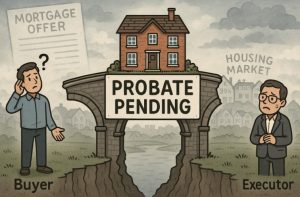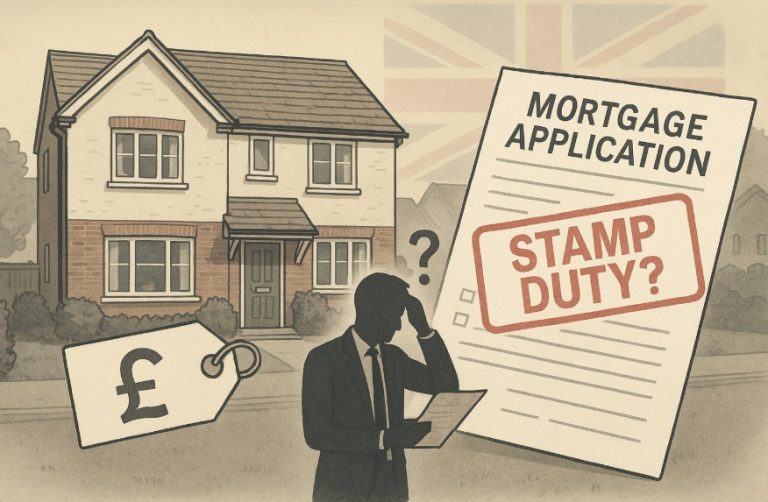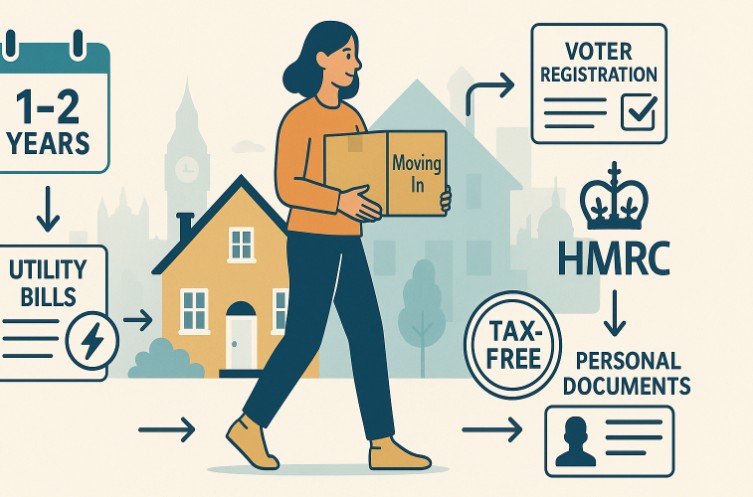Selling a property after a loved one passes away can be complex, especially when probate is involved. Many people ask whether it’s possible to sell a house before probate is granted.
The answer depends on several legal and ownership factors. Understanding the rules, risks, and potential exceptions is essential for executors and beneficiaries navigating this process.
This guide outlines the legal framework, what actions can be taken before probate, and how to proceed without risking delays or disputes.
What Is Probate and Why Is It Required to Sell a Property in the UK?

Probate refers to the legal right to deal with someone’s estate, including their property, after they die. If the deceased left a will, it will name an executor responsible for managing the estate. This executor must apply for a Grant of Probate before they can sell or transfer ownership of any assets, especially property.
The probate process is designed to confirm that:
- The will is valid
- The right person is administering the estate
- Debts and taxes are settled before distributing assets
Without the grant, financial institutions and the Land Registry won’t permit any sale or transfer of the property. Therefore, even if a buyer is lined up, the transaction can’t proceed until probate has been legally obtained.
Can an Executor Legally Sell a House Before Probate Is Granted?
An executor does not have the authority to legally complete the sale of a house before receiving the Grant of Probate. Although they can initiate preparatory tasks, such as instructing an estate agent or organising a valuation, they cannot exchange contracts or complete the transaction.
There is a legal distinction between:
- Marketing or preparing to sell a property
- Completing the legal transfer of ownership
Only the latter requires the executor to hold a Grant of Probate. Entering a sale agreement before probate is granted may be viewed as misleading or even invalid, especially if the buyer is unaware of the estate’s legal limitations.
Are There Any Circumstances Where a Property Can Be Sold Before Probate?

A house may be sold before probate is granted in specific situations. The most common example is when the property was owned as joint tenants. In this arrangement, the deceased’s share of the property automatically passes to the surviving owner, bypassing the need for probate.
If the property is owned as tenants in common, each owner has a distinct share, and the deceased’s portion becomes part of their estate. In this case, probate is required before any sale or transfer can occur.
Other possible exceptions include:
- Assets held in certain types of trusts
- Low-value estates under bank-specific thresholds (though this rarely applies to property)
What Are the Legal Risks of Selling a House Without Probate?
Attempting to sell a house before obtaining probate may appear as a time-saving option, but in the UK, it is almost always unlawful and fraught with serious legal risks. Executors or family members who go ahead with a sale without the Grant of Probate could face a variety of consequences, both civil and financial.
1. Lack of Legal Authority
Without a Grant of Probate, the executor does not have the legal right to sell or transfer ownership of the deceased’s property. The grant acts as formal confirmation from the Probate Registry that the named executor is authorised to deal with the estate.
Proceeding with a sale in the absence of this document means that:
- The sale could be rendered legally void.
- The Land Registry will not register a new owner.
- Mortgage lenders will not release funds to a buyer.
Any contracts signed before the grant is issued are typically non-binding and could result in disputes.
2. Contractual Liability
If a buyer is misled into thinking the property sale can proceed without delay, they may suffer financial loss — for example, from surveys, solicitor fees, or mortgage arrangements. This could lead to legal action against the executor for misrepresentation or breach of contract.
A buyer may also:
- Withdraw from the sale due to uncertainty
- Demand compensation for lost costs
- Issue a formal complaint or legal claim against the estate
It’s vital that any agreement before probate is marked clearly as “subject to grant of probate” to avoid misleading the buyer.
3. Breach of Fiduciary Duty
Executors have a fiduciary duty to act in the best interests of the estate and its beneficiaries. This includes complying with legal requirements, securing fair value for the property, and ensuring full transparency.
Selling a house without proper authority, or before inheritance tax obligations are settled, could result in:
- Claims from beneficiaries for mismanagement of the estate
- Personal liability for financial losses or legal costs
- Potential removal as executor by the court
In some cases, if the property is sold below market value, the beneficiaries may pursue legal action to recover the financial difference.
4. Inheritance Tax and HMRC Complications
Selling a property before paying the required inheritance tax can trigger issues with HM Revenue & Customs. HMRC requires payment of inheritance tax within six months of the date of death. If a sale is rushed or done incorrectly, it may:
- Jeopardise compliance with tax law
- Lead to additional interest or penalties
- Raise questions about the valuation and sale process
All sales should reflect accurate valuations as submitted during probate. Underpricing or failing to report the sale properly may trigger a tax investigation.
5. Exposure to Delays and Buyer Withdrawal
Without probate, no sale can legally complete, regardless of how far along the transaction process is. Buyers may become frustrated with extended timelines and could:
- Withdraw their offer
- Reduce their offer price
- Move on to other properties
This disrupts the estate’s timeline and may result in lower sale proceeds, impacting beneficiaries.
6. Disputes Among Family or Beneficiaries
If one family member or co-executor attempts to sell a house without probate or without agreement from others involved in the estate, it may cause internal disputes. Beneficiaries may feel excluded, question motives, or challenge the validity of the sale.
Such conflicts can result in:
- Court applications to freeze the estate
- Delays in distributing assets
- Damage to family relationships
How Long Does the Probate Process Typically Take in the UK?
The probate timeline varies depending on the complexity of the estate. In 2024 and into 2025, many straightforward applications are taking around 16 weeks to process.
More complex cases may experience delays due to:
- Missing documents
- Disputes among beneficiaries
- Unresolved tax or legal issues
Executors should begin the probate application process as early as possible to avoid extending the sale timeline.
Can You Market the Property Before Receiving Probate?
It is legally permissible to market a property before probate is granted. However, any advertisements must clearly state that the sale is “subject to probate.” Estate agents must disclose this in all communications and marketing materials.
While early marketing can generate interest, some buyers may be deterred by the potential wait. Therefore, it is crucial to maintain transparency and manage expectations from the outset.
What Should Executors Know Before Listing a Probate Property?
Before listing the property, executors should prepare by:
- Obtaining a probate valuation from a qualified surveyor. This figure will be used for inheritance tax purposes.
- Locating the title deeds and confirming the ownership structure
- Checking the will for any specific instructions about the property
- Ensuring the property has a valid Energy Performance Certificate (EPC)
- Maintaining appropriate insurance for unoccupied properties
These steps reduce the chance of complications during the transaction process.
Is It Possible to Speed Up the Probate Process to Sell Faster?
While the probate system involves fixed procedures, some actions may help avoid unnecessary delays:
- Submit accurate and complete information in the initial application
- Respond quickly to any queries from the Probate Registry
- Use a solicitor experienced in probate matters to handle correspondence
- Pre-book property valuations and legal support services
In certain time-sensitive situations, a solicitor may apply for expedited probate, but such requests are not always granted.
What Happens to the Sale If Probate Is Delayed?

Delays in obtaining probate can significantly affect the progress of a property sale. In the UK, probate is a legal prerequisite for transferring ownership of a deceased person’s property when they were the sole owner or held their share as tenants in common.
If probate is not granted in a timely manner, it can introduce uncertainty, risk, and financial consequences for both the estate and prospective buyers.
1. The Sale Cannot Legally Complete
Until the Grant of Probate is issued, the executor or administrator does not have the legal authority to complete the sale. This means that:
- Contracts cannot be exchanged
- The property cannot legally change ownership
- The buyer’s solicitor cannot proceed with final checks or transfer of funds
Even if a buyer has made an offer and is ready to proceed, the sale will remain in limbo until probate is granted.
2. Buyers May Withdraw or Reduce Their Offer
Buyers often operate within a chain or time-sensitive framework. If they perceive that the probate process is dragging on with no clear completion date, they may:
- Withdraw their offer entirely and move on to a different property
- Reduce their offer, citing market fluctuations or inconvenience
- Demand contractual reassurances that cannot be fulfilled until probate is granted
This can ultimately affect the financial return to the estate, particularly if the offer accepted was above average or if the property market begins to decline during the wait.
3. Risk of Chain Collapse
In cases where the buyer is part of a property chain, any delay in one transaction can jeopardise the entire sequence. If probate is delayed and the buyer cannot wait, they may need to purchase another property to keep their own sale intact, causing the original sale to fall through.
This is particularly risky in competitive or fast-moving markets where timing is critical.
4. Estate May Incur Holding Costs
While waiting for probate, the estate remains responsible for the costs associated with maintaining the property. These can include:
- Council tax (at discounted or full rate, depending on local rules)
- Insurance premiums for unoccupied properties
- Utility bills (especially if heating is left on in winter to prevent damage)
- General upkeep or security measures
The longer probate takes, the more these costs accumulate, potentially reducing the total inheritance available to beneficiaries.
5. Mortgage Offers May Expire
Many mortgage agreements have a limited validity period, typically ranging from three to six months. If probate delays extend beyond this window, the buyer’s mortgage offer could expire. This may force them to:
- Reapply for finance, which may not be approved again
- Incur additional costs in arrangement fees
- Reconsider their decision to buy the property altogether
In a worst-case scenario, this can lead to cancellation of the sale and the loss of a committed buyer.
6. Market Conditions May Change
Delays caused by probate can mean missing the ideal window for selling the property. For example:
- A strong seller’s market could weaken, reducing demand and prices
- Changes in interest rates may affect buyer affordability
- Seasonal slowdowns (such as winter) may reduce activity and interest
This has direct implications for the estate’s financial return and may require the property to be re-listed at a lower price later on.
7. Prolonged Emotional Burden for Families
Beyond financial and legal consequences, extended delays in the property sale can cause distress for grieving families. Selling a loved one’s home often provides emotional closure and helps move forward with the estate’s administration.
When probate delays the sale for months or even longer:
- The property remains a lingering responsibility
- Family members may be unable to move forward with their own plans
- Ongoing disputes among beneficiaries may intensify
In some cases, delays also affect dependent beneficiaries waiting for funds to cover housing, education, or care costs.
Are There Any Exceptions Under UK Law for Selling Without Probate?
Aside from properties owned as joint tenants, other exceptions include:
- Properties held in a trust structure where the trustees have authority to sell
- Certain types of life insurance or pensions that pay directly to a named beneficiary
- Very low-value estates where financial institutions do not require a Grant of Probate
However, in nearly all cases involving property sales, especially where the deceased was the sole owner or a tenant in common, probate is mandatory before legal ownership can transfer.
How Does Selling a Probate House Differ from a Normal Property Sale?
A probate sale involves additional legal steps, timing considerations, and tax implications that differ from a typical property sale.
| Key Difference | Probate Sale | Normal Sale |
| Requires Grant of Probate | Yes | No |
| Delay in Contract Exchange | Yes, until probate is granted | No delay if terms agreed |
| Legal Representation | Often required | Optional but advised |
| Inheritance Tax Considerations | Yes | No |
| Capital Gains Tax Potential | Yes | Rarely |
Additionally, executors must sell the property for fair market value, as undervaluing can lead to legal claims from beneficiaries or tax inquiries from HMRC.
What Are the Best Practices for Executors Selling Probate Property?

Executors should aim for compliance, transparency, and efficiency. Some key best practices include:
- Instructing a solicitor with probate and conveyancing experience
- Getting a formal property valuation for probate and sale
- Keeping beneficiaries informed throughout the process
- Ensuring the property is secured and insured
- Preparing all required documentation early
If selling before probate is granted is being considered due to urgency, it’s worth exploring options like probate bridging loans to manage financial commitments while waiting for legal authority.
Conclusion
While selling a house before probate is generally not allowed, there are specific situations where limited steps can be taken. Executors must act within the law, protect the estate’s interests, and ensure transparency with all parties involved. Knowing when and how to proceed helps prevent delays, legal issues, and financial risks.
By understanding the process and seeking professional support, those responsible for managing an estate can navigate probate property sales confidently and with compliance to UK regulations.
Frequently Asked Questions
What if someone tries to sell a house without probate?
If a property is sold without probate, the sale is likely invalid, and legal disputes may arise. Buyers can back out, and executors may face legal consequences.
Can beneficiaries agree to sell a property early?
Beneficiaries cannot override the legal requirement for probate. However, they may consent to marketing or property preparations.
What happens if the property market drops during probate?
If prices drop during the waiting period, the executor may have to sell for less, as long as it’s within fair market value. Timing and valuation are crucial.
Who pays for property upkeep during probate?
The estate typically covers costs such as insurance, utility bills, and maintenance during probate. Executors must manage these expenses responsibly.
Can probate be expedited in urgent property sales?
In rare cases, expedited probate can be requested with justification, such as financial hardship or risk to the estate. Legal professionals can assist.
Does the value of the house affect probate speed?
While property value doesn’t directly affect the timeline, more valuable or complex estates may face longer scrutiny and paperwork delays.
Is a solicitor needed to sell a probate property?
Although not mandatory, hiring a solicitor experienced in probate sales is strongly advised to avoid legal risks and ensure smooth transfer.






